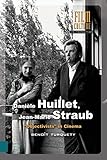Danièle Huillet, Jean-Marie Straub : objectivists in cinema / Benoît Turquety ; translated from the French by Ted Fendt.
Material type: TextLanguage: English Original language: French Series: Film culture in transitionPublisher: Amsterdam : Amsterdam University Press, [2020]Description: 1 online resource (315 pages)Content type:
TextLanguage: English Original language: French Series: Film culture in transitionPublisher: Amsterdam : Amsterdam University Press, [2020]Description: 1 online resource (315 pages)Content type: - text
- computer
- online resource
- 9789048543069
- 9048543061
- Danièle Huillet, Jean-Marie Straub. English
- 790 23
- PN1998.3.S77 T8713 2020
| Item type | Home library | Collection | Call number | Materials specified | Status | Date due | Barcode | |
|---|---|---|---|---|---|---|---|---|
 Electronic-Books
Electronic-Books
|
OPJGU Sonepat- Campus | E-Books EBSCO | Available |
Cover -- Contents -- Introduction -- Part One Foundations -- 1. Erotic Barbarity: Othon -- A Play, A Film -- Principles -- Tradition and Opacity -- 2. Objectivity and Objectivities -- Huillet and Straub-style "Objectivity" -- Objectivities -- The Objectivists: A History -- Objectivist Poetic Theory -- Part Two Language/Authority -- 3. The Power of Speech (or the Voice), of Seeing and the Path: Moses And Aaron -- Moses, Aaron, Schoenberg, Huillet & Straub -- The Cinematic Form of (the Absence of) God: "The Calling of Moses" -- Language Remains -- Birth of a Nation: Act II and End
Objective on Objective: Huillet and Straub's Position -- 4. Speech against Power, or Poetry, Love, and Revolution: "A"-9 -- A Poem, History -- The Form of "A"-9 -- Value and Meaning: Capitalism and Abstraction -- Love as a Poetic/Revolutionary Technique -- Part Three Interruptions -- 5. Cinema, Poetry, History: Immobilizations -- Introduction to Arnold Schoenberg's "Musical Accompaniment to a Cinematographic Scene": Motion and Pause, Cinema as History -- From Ideogram to Fugue: Poetry/Cinema -- Interruptions -- Continuities -- History Without a Name -- Braiding, Cutting
Part Four Trials, Series -- 6. Industrial Civilization for the Last Time: Class Relations -- Trials -- On Space -- 7. On Dissolution -- Speech Without Authority: The Death of Empedocles -- On Dismantling: Testimony and Workers, Peasants -- Conclusion -- About the Author -- Index
Includes bibliographical references and index.
Danièle Huillet and Jean-Marie Straub collaborated on films together from the mid-1960s through the mid-2000s, making formally radical adaptations in several languages of major works of European literature by authors including Franz Kafka, Bertolt Brecht, Friedrich Hölderlin, Pierre Corneille, Arnold Schoenberg, Cesare Pavese, and Elio Vitorrini. The impact of their work comes in part from a search for radical objectivity, a theme present in certain underground currents of modernist art and theory in the writings of Benjamin and Adorno and in a long-forgotten movement of American modernist poetry, "Objectivism," whose members included Louis Zukofsky, George Oppen, and Charles Reznikoff, with connections to William Carlos Williams and Ezra Pound. Through a detailed analysis of the films of Straub and Huillet, the works they adapted, and Objectivist poems and essays, Benoît Turquety locates common practices and explores a singular aesthetic approach where a work of art is conceived as an object, the artist an anonymous artisan, and where the force of politics and formal research attempt to reconcile with one another
Online resource; title from digital title page (viewed on August 06, 2020).
eBooks on EBSCOhost EBSCO eBook Subscription Academic Collection - Worldwide
There are no comments on this title.

